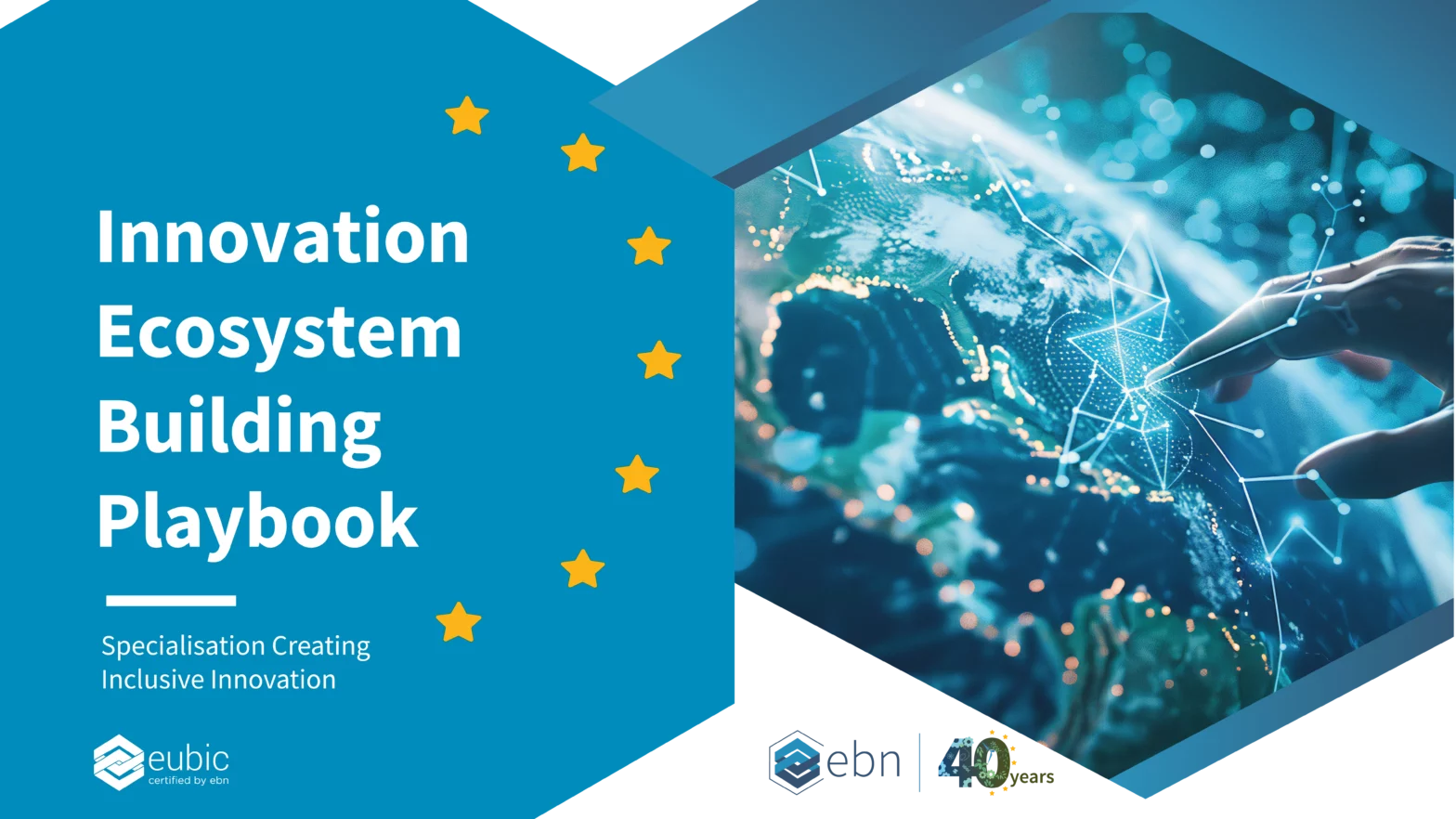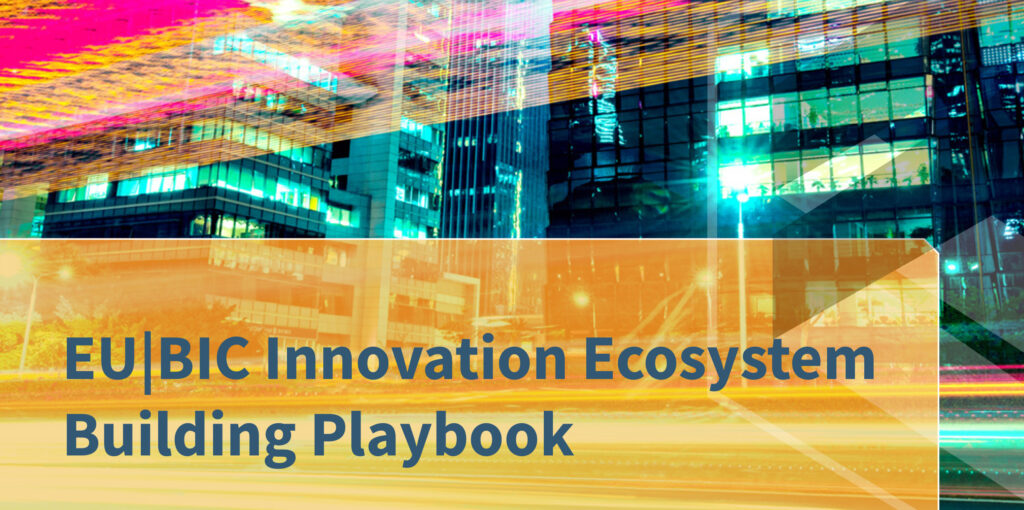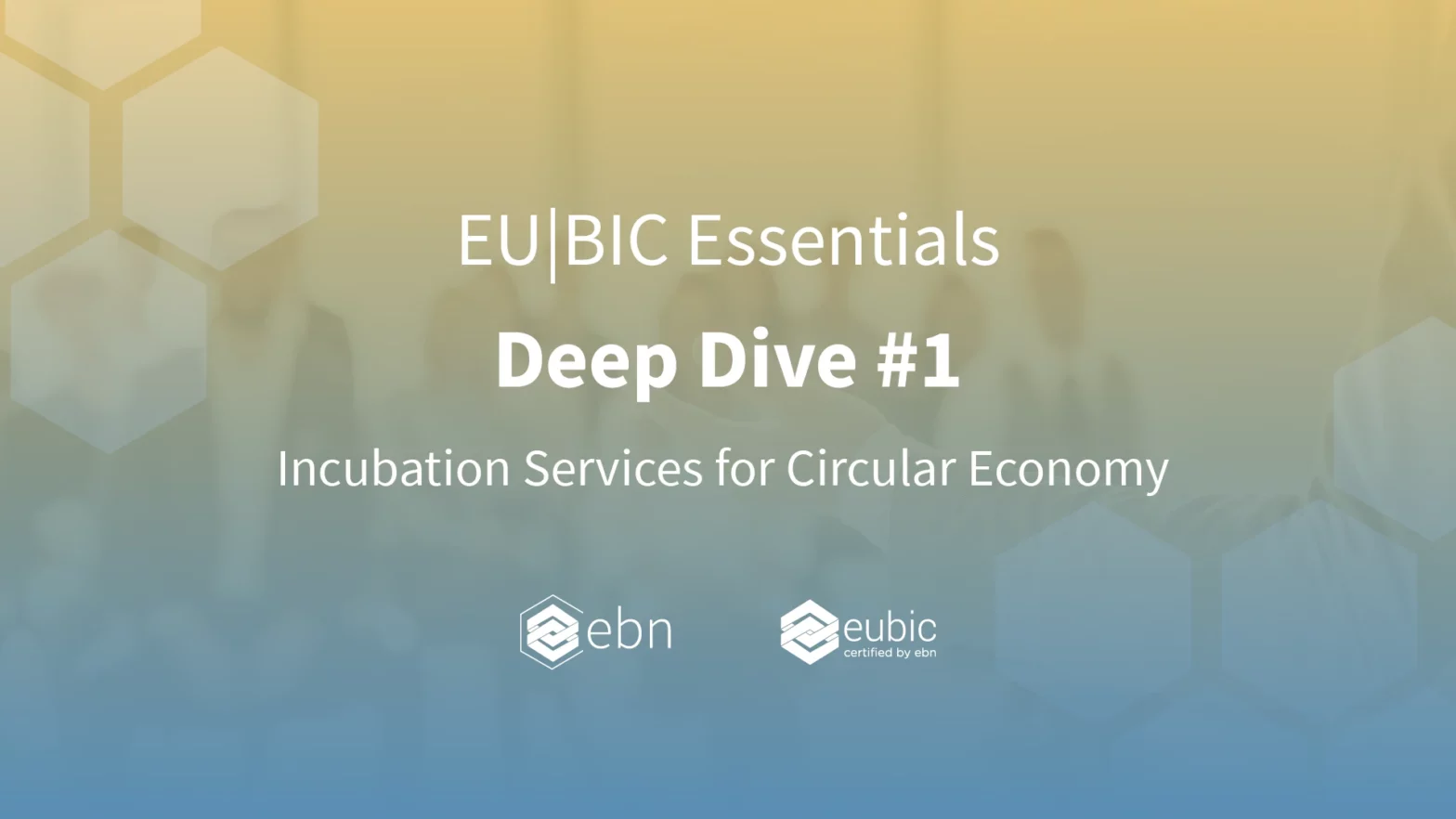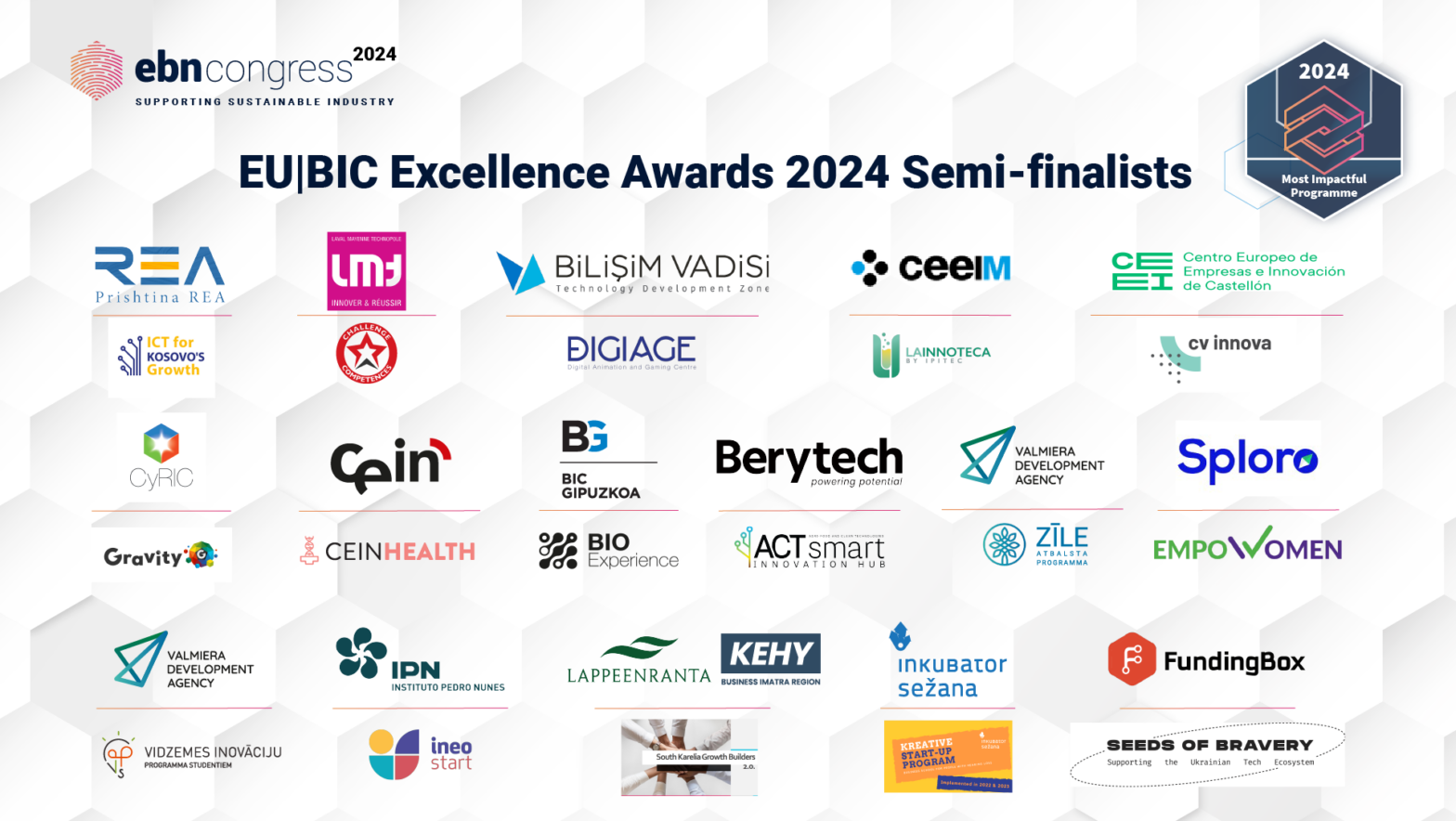Innovation Ecosystem Building Playbook: Specialisation Creating Inclusive Innovation

While global challenges require coordinated action, they manifest themselves locally with diverse and complex specificities. Involving community-based stakeholders in regional innovation ecosystems can address issues effectively by leveraging local resources, expertise, and networks. By embracing regional specificities, innovation ecosystems support the development and upscaling of context-specific specialised solutions to our current challenges. This approach ensures relevance, effectiveness, and local ownership, ultimately leading to sustainable and impactful outcomes.
EU|BIC community members, committed to promoting sustainable economic development for four decades, are partnering with mission-aligned partners to address an ever-changing landscape. Through a cohesive and integrated approach often led, supported, and funded by the EU, Europe is focused on creating a vibrant, diverse, competitive, and inclusive innovation infrastructure. The EU provides funding and addresses regulatory barriers. The EU’s commitment is exemplified through the Horizon Europe Programme, with a budget of €95.5 billion allocated to research and innovation (R&I) between 2021 and 2027. This programme focuses on addressing climate change, achieving Sustainable Development Goals (SDGs), boosting the block’s competitiveness, accelerating the twin (digital and green) transitions, (re)building ecosystems, and promoting a circular economy and an inclusive society. Its projects crucially emphasise collaboration and cohesion as the best means to its ends.
The Green and Digital transition will necessitate significant changes in production and consumption systems. Past industrial transitions shown that policy plays a crucial role in anticipating needs, aiding businesses in positioning themselves for future opportunities, and mitigating the high social costs of transitions.
Comment by European Commission, Joint Research Centre Seville – Knowledge for Policy – in the EU|BIC Innovation Ecosystem Building Playbook
Innovation is essential to minimize the potential trade-offs between sustainability, economic growth, and social cohesion. Therefore, innovation policy must be a top priority. However, traditional innovation policy is not enough. Challenge-oriented innovation is a potential solution. By involving many stakeholders, mitigates the risks to social cohesion and increases the chances of creating lasting solutions. However, it requires more comprehensive coordination within the region. EU|BICs are essential actors within this approach. They stand at the crossroads between various important policy portfolios and governmental levels, and between the policymakers, civil society and other important (specialised) stakeholders.
Challenge-oriented innovation policies begin with a societal issue that are widely recognised and understandable to citizens, such as pollution, social integration of marginalised groups, or the future of transitioning industries. From there, decision-makers and stakeholders collaborate to address the problem. This involves working with problem owners, who can be anyone from patients to farmers to commuters. The goal is to connect challenge holders with the right solution providers. The value of challenge-oriented innovation is that it provides a simple organising principle for cooperation in fragmented decision-making structures. Local challenges can be a rallying point for stakeholders to form partnerships and work together. In a complex world, achieving consensus can be difficult. A coalition of the willing can begin exploring pathways to finding solutions. These coalitions can emerge in any given territory, whose shape and size will vary over time.
How Smart Specialisation Strategies enable all places to innovate and help all regions to become the best that they can be.
Esther Peñalver, Managing Director at EU|BIC CEEI Murcia
With citizens steering the conversation, Responsible Research and Innovation (RRI) practices have the potential to mobilise European citizens and entrepreneurs around common goals and offering a multitude of opportunities to participate in change.
Excellent innovators and their supporters more and more operate from the paradigm that opening science and innovation to civil society advances human knowledge and accelerates the transformation of our communities towards more sustainable and resilient practices.
“Smart Specialisation Strategies resilient practices’’, if well designed, equipped with adequate resources and properly managed, they contribute to addressing the new European challenges. Crucially, these strategies must respond to a series of key questions to ensure their coherence but, above all, to keep them connected to the real needs of society. Responsible Research and Innovation (RRI) seeks the participation of society in science and innovation, from the earliest stages, to align its results with the values and goals of all the actors involved, a fundamental issue for the design, implementation, and evaluation of smart specialisation strategies. It is crucial to realise how innovation systems and policies have been evolving in the last decades, through different approaches. If in the 1950s it was all about stimulating industry to invest more in Research and Technology development, the 90s focused on connecting actors – fostering the creation of ecosystems and public-private partnerships.
Now, in the 2020s era, policies are more and more focused on stepping up societal transitions, with the emergence of a challenge-driven innovation policy, stimulating targeted and selective innovations. Many persistent problems in the world, such as climate change, ageing population or economic inequity, can only be efficiently addressed if we radically change our economy and the way we have organised society.
Formulating missions with specific goals can be a powerful tool for challenge-driven innovation policies and instruments. A mission boosts and guides regional innovation ecosystems, with both a sense of urgency and a sense of meaning.
By aligning efforts with key EU innovation priorities, regional innovation support stakeholders have fostered a greater, more inclusive, and dynamic innovation ecosystem, ensuring significant regional economic growth. Regional research and innovation ecosystems face complexity and uncertainty, requiring place-based approaches and the engagement of diverse stakeholders from the start. Open, Responsible, and Inclusive Innovation processes offer a holistic framework to address societal needs and regional priorities while fostering innovation. In addition, demand-driven innovation and co-creation, when well-orchestrated at the regional level, can lead to inclusive, sustainable, and scalable solutions. Identifying ecosystem orchestrators who facilitate dialogue and collaboration among stakeholders is crucial for connecting societal challenges with policy strategies and defining innovative solutions that are likely to be accepted and sustainable in the long term.
However, the innovation landscape of Europe is not all the same. On an ecosystem level, an often-observed complexity is that the more innovation is needed to grow an economy, the more difficult it is to invest in its innovation potential. Paradoxically, this means that regions which lag economically have more difficulty absorbing public funds to promote innovation more effectively (the Regional Innovation Paradox1). The EU is focused on levelling up the regions with lower innovation performances. Such a task demands leveraging strategic areas of regional strength and specialization as outlined in their smart specialization strategies.
The I3 Instrument aims to bridge innovation gaps among EU regions by fostering interregional collaboration and investment through the Smart Specialisation principle. It targets less developed regions to enhance their innovation ecosystems and value chains, promoting job creation and growth. By aligning bottom-up priorities with EU strategies, it strengthens local innovation capacities, particularly in less developed regions, contributing to the overall competitiveness and resilience of the EU innovation system. The initiative focuses on building capacities in less developed regions to support interregional innovation projects, addressing challenges such as inadequate institutional environments and technology maturity levels. Projects under this initiative aim to facilitate investment idea validation, identify gaps and business opportunities, and involve stakeholders from the quadruple helix, emphasizing the active participation of companies and civil society. Additionally, the initiative encourages experimentation with innovative approaches and ensures knowledge transfer and sustainability beyond project completion.
Unlocking Sustainable Impact: LLAMP 3i by EU|BICs in the Valencian Community
LLAMP 3i is a game-changer for companies aiming to align with the Sustainable Development Goals (SDGs). The Valencian Institute of Business Competitiveness (IVACE) and CEEI Valencia has pioneered the first self-diagnostic test for quantifying the social and environmental impact of businesses, enabling entrepreneurs to assess their sustainability strategies systematically.
LLAMP 3i is an advanced acceleration programme that empowers companies to achieve triple innovative impact: social, environmental, and sustainable economic. Through personalised roadmaps, mentoring sessions, and advisory support, participants receive comprehensive guidance tailored to their unique needs. The programme also facilitates group sessions with SDG experts, communication workshops, participation in fairs/demo days for enhanced visibility, and the chance to compete for the prestigious Triple-Impact Awards.
Implemented by esteemed EU|BICs like CEEI Castellón, CEEI Elche, and CEEI Valencia, LLAMP 3i has successfully completed three editions, leaving a profound mark on participating companies. It’s a catalyst for positive change, propelling businesses towards sustainable growth while aligning with the SDGs. Join us on this impactful journey, where sustainable innovation meets success.
Another noteworthy initiative that showcases the power of collaboration is the Regional Innovation Valleys action by the European Commission. Introduced as part of the New European Innovation Agenda, the Regional Innovation Valleys are an essential instrument for achieving economic development and social welfare. These valleys bring together selected regional ecosystems, leveraging their smart Specialisation strategies while also addressing specific local challenges and needs. By coordinating research and innovation investments and policies, these ecosystems contribute to the Union’s strategic priorities. The aim is to advance European innovation ecosystems, foster interconnectivity, and bridge the gap for regions that are lagging.
The world’s best innovation ecosystems share common qualities that foster collaboration, attract talent, promote entrepreneurship, and provide a supportive environment for research, funding, and market access. By understanding and cultivating these key qualities, organisations and governments can position themselves at the forefront of innovation, driving economic growth and maintaining a competitive advantage in the global landscape.
EU|BIC Innovation Ecosystem
In the pursuit of thriving European and regional innovation landscapes, it’s imperative to harness the power of collaboration and collective action. As we navigate this transformative era, BSO/ESOs, EU|BICs stand as pivotal connectors, fostering synergies among stakeholders and catalysing entrepreneurial success. To delve deeper into the intricacies of building resilient innovation ecosystems, explore the EU|BIC Innovation Ecosystem Building Playbook. Embark on a journey of discovery and empowerment, shaping a future where innovation fuels sustainable growth and prosperity for all.









